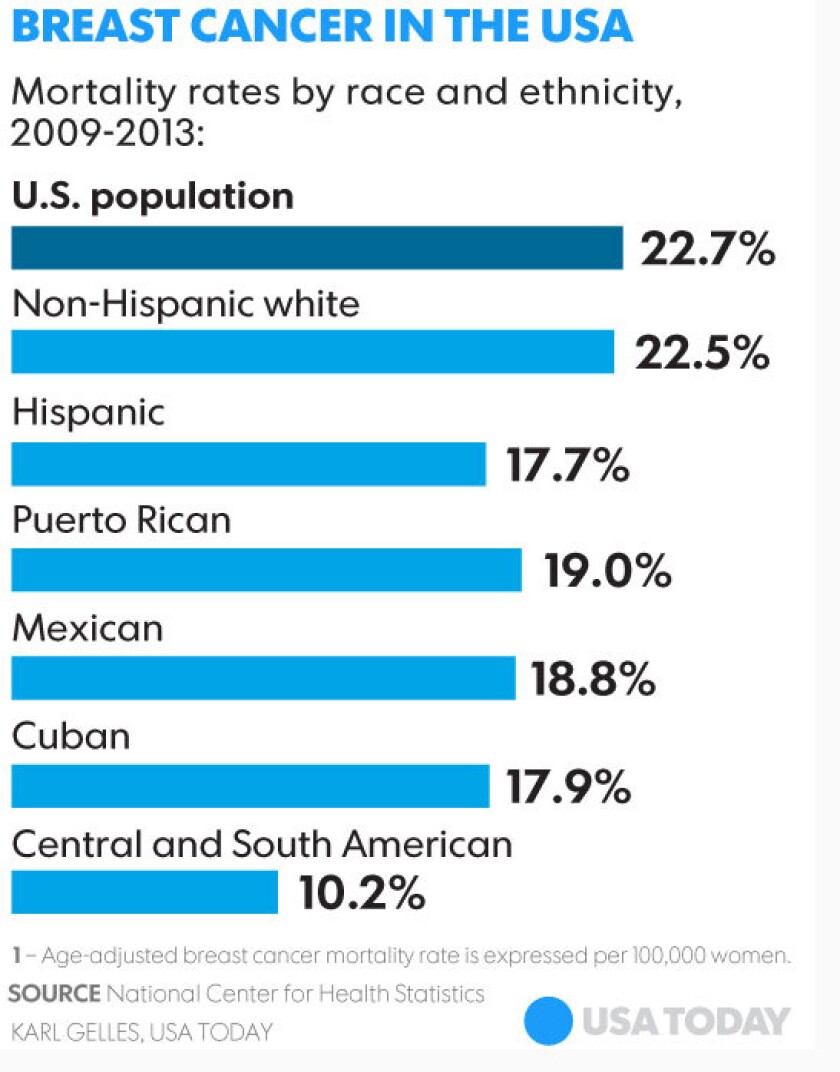If you are Mexican or Puerto Rican, you are more likely to die from breast cancer than other Hispanic women in the U.S., according to a study released Thursday that could have significant implications for the treatment and care of Latino women.
The research by the Avon Foundation for Women, the first of its kind on Hispanic subgroups, shows how mortality rates differ for Cuban, Mexican, Puerto Rican and Central and South American women with breast cancer in the U.S.
“A critical first step to improving breast cancer prevention, diagnosis and care for Hispanic women is understanding where the greatest needs are,” says Cheryl Heinonen, Avon Foundation president. “The more we know, the better we will be at improving care, quality of life and survival rates.”
Breast cancer is the most commonly diagnosed cancer and leading cause of cancer death in Hispanic women, according to the American Cancer Society.
“Knowing that the mortality risk is higher for Puerto Rican and Mexican women with breast cancer can absolutely help to inform caregivers, patient navigators and physicians,” Heinonen says.
The mortality rate for Puerto Rican women with breast cancer in the U.S. is 19.04 deaths per 100,000 women; for Mexicans, 18.78 per 100,000; and for Cubans, 17.89 per 100,000, according to the study, which will be published in the Journal of Cancer Epidemiology and was presented at a cancer forum in Miami on Thursday.
Central and South American women, by contrast, had a much lower mortality rate: 10.15 deaths per 100,000 women.
Overall, Hispanic women still lag behind Non-Hispanic white women, the data found: 17.71 breast cancer deaths per 100,000 women vs. 22.49 for white women. A 2015 American Cancer Society report found Non-Hispanic black women in the U.S. had the highest mortality rates of all racial groups at 31 breast cancer deaths per 100,000.
Paola Giorello, 37, a breast cancer survivor from Uruguay, knows well the hurdles many Latino women face when it comes to health issues. Giorello noticed a lump in her breast in February 2015. Because she was 36 and without insurance, she says her doctor wouldn’t authorize a mammogram. “Come back when you’re 40,” she said he told her.
Giorello enlisted the help of non-profit Nueva Vida, which advocates for Latino families on cancer issues. She finally was able to get a mammogram, which detected a cyst in her right breast. But she was told to come back in another six months.
In the coming months, she felt the cyst thickening and lumps appeared under her arm. She and her patient advocate pressed for another mammogram.
One year later, in February, she was given a diagnosis that rocked her world: breast cancer. “I was so angry that all this time they had been telling me I was fine, that I needed to wait until I was 40 to even be checked,” says Giorello, who had a lumpectomy and is now cancer-free.
Claudia Campos Galván, survivorship program director for Nueva Vida, says the new research will help Hispanic women with screening and treatment by no longer lumping Hispanics “into one homogeneous group.” But she notes that access to care is still complicated for some by everything from lack of insurance to transportation to child care to cultural issues that might engender mistrust.
“Low-income Latinos are more likely to have low health literacy and health knowledge, live in low-resourced communities and experience chronic stress such as money worries and everyday racism (that often accompanies poverty),” she says.
The study’s author, Bijou Hunt, says more research needs to be done to fully understand why certain subgroups have higher mortality rates. “It could be a wide number of factors, including everything from genetic traits to differences in diet and lifestyle that may vary by culture,” she says.
The study, which covered 2009 to 2013 and included women of a certain descent as well as those born in their native countries, shows “the end result, but more exploration is needed to understand the cause behind them,” Hunt says.
But the findings of the study, which was conducted by Sinai Urban Health Institute, speak volumes for the need for individualized care, she says.
Giorello’s cancer journey has taught her one resounding lesson that she hopes other Hispanic women will take to heart: Pay attention to your body.
“I think many Latinas have a mentality of trusting authority. They want to listen to what the doctor says even if that means going against what they are feeling,” she says. “You have to be your own biggest advocate. Trust yourself. Speak up. Seek out second opinions. Ask lots of questions. … And never give up.”
Susan Miller, USA TODAY
October is National Breast Cancer Awareness Month. For information, visit nationalbreastcancer.org






